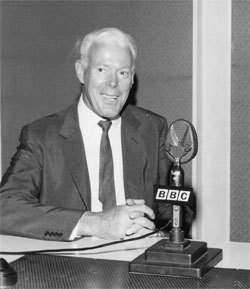Impossible 2 November 1987
Trevor Leggett was head of the Japanese Department of the BBC.

This is one of his broadcasts to Japan
Zubari for 2 November 1987
Impossible
Hello listeners! Today I want to talk about meeting the impossible.
Well, listeners! What would you do if you observed – right in front of you – something impossible happening? Would you cry out: ‘But this is impossible!’ or would you escape from the place and try to forget all about it? Or would you simply go on as if nothing happened?
Recently, I have read some reports which show that English people sometimes just try to go on as if nothing had happened. Here is the first one. It is about an experiment which a Professor of Psychology at London University used to try on some students.
He used to invite three or four of them to his house for tea. He had a big room, and in one corner there was parrot in a cage. But it remained silent. Then he said that he was going to put on a recording of a famous actor reciting a speech from the ancient Greek epic poem called the Iliad. In this poem, there is a speech by a horse, in praise of loyalty. It is a well-known and moving speech. But it is spoken by a horse.
Well, the Professor told them to listen, and then give their opinions whether the speech was poetically effective coming from a horse. He put on the recording, and went out of the room. He left the door ajar, so that he could hear everything.
The students always sat quietly, listening to the horse’s speech. Then it ended. But before any of the students could speak, the parrot suddenly shouted: ‘WHAT NONSENSE! HORSES CAN’T TALK! EVEN IF A HORSE COULD TALK, HOW COULD IT EVER SAY ANYTHING SENSIBLE?’
The Professor reported that in nearly every case, the students, confronted with the impossibility that the parrot was making intelligent comments, were struck dumb for a moment. But then they just began to discuss the poetry, simply ignoring the fact that the parrot had intervened.
In fact, of course, the parrot had been trained to keep absolutely silent till the end of the horse’s speech. Then it uttered its shout ‘WHAT NONSENSE…’ etc. But to the students, not knowing this, it must have seemed like a miracle. Still, in most cases they tacitly agreed not to mention it, but just carried on.
The second case is even more extreme.
Another Professor of Psychology was giving a lecture on the so-called ‘psychic phenomena’. On the lecture table was a metal bowl of flowers. In the middle of the lecture, he said: ‘Let us do an experiment. Let’s try to levitate something. What shall we choose? Well – let’s choose this bowl of flowers, shall we? Now, please all of you, WILL that this bowl of flowers rises into the air. To help us concentrate, let’s all repeat the magic Indian word ‘OM’ loudly.
So, they all repeated long OM-s for about five minutes. Then he asked: ‘Well, any of you who saw the bowl rise, please raise your hands.’
About half the audience raised their hands, while the others looked at them scornfully.
Then he said: ‘Those who did NOT see the bowl rise, please raise your hands.’ The other half of the audience raised their hands. ‘You are the hard-headed materialists,’ said the professor. ‘You are sure that the bowl could not have risen. But as a matter of fact, it did rise. Under the table is a magnetic suspension apparatus. I switched it on when we were all saying OM loudly, so that you could not hear its hum. I just wanted to prove that materialists create illusions to support their materialism, just like credulous people do.’
This experiment was not widely reported in the press. Probably most pressmen are materialists, and they had a tacit agreement not to mention such an embarrassing thing.
Perhaps the safest way to protect oneself against meeting the impossible is this: have nothing to do with Professors of Psychology.
© Trevor Leggett